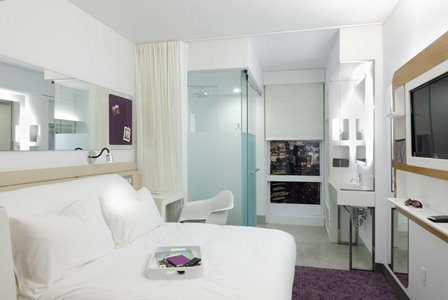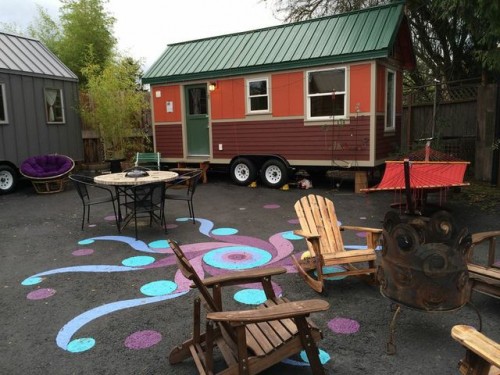While some hotels trumpet the ample square footage of their guest rooms, others rely on quirky coziness to attract customers.

Yotel, for example, offers ship-cabin-inspired rooms at several European airports and operates a full-sized hotel filled with snug (170-square foot), extremely efficiently-designed rooms near Times Square in New York City. The chain plans to open another Yotel hotel on upscale Orchard Street in Singapore. Other pod hotel have been making big business in small spaces.
Last summer, in Portland, Ore., a couple inspired by the growing Tiny House movement—which celebrates downsizing and promotes housing affordability—opened Caravan, billed as the country’s first hotel comprised of tiny, self-contained houses.
“We’re concerned with environmental impact of housing and are proponents of the alternative housing movement in Portland,” said Deb Delman, a part-time teacher who runs Caravan—The Tiny House Hotel with her husband, Kol Peterson, whose day job is with the U.S. Forest Service.
When a repossessed car lot came up for sale in the recently gentrified but still funky Alberta Arts District of Portland where Delman already owned a house, “we came up with the idea to showcase small housing designs by opening a tiny house hotel,” she said.
Licensed for up to six small structures, Caravan’s lot currently has four tiny guest houses, ranging in size from 100 to 160 square feet. (By contrast, typical hotel rooms range from 303 to 578 square feet, according to HVS International’s 2013 Hotel Cost Estimating Guide.)
Each tiny guest house is on wheels, with hot running water, showers, flush toilets, full-size beds, small kitchens and sitting areas that could be “as big as a table or as small as bench,” said Delman. Room service is provided by a restaurant across the street.
And while the words “caravan,” “wheels” and “tiny” might summon up images of recreational vehicles and weekend campers, “these are real homes that are connected to the city’s water and sewer system” with all the elements of fine, handcrafted larger homes, Delman said, “just smaller.”
“Rosebud is our smallest house and Skyline, with lots of reused and recycled items, is the most ‘Portland’ of them all and two more tiny houses should roll in this summer, “including a cute little one—Roly Poly—that should show up in July,” said Delman.
Leased from the growing pool of local tiny house builders, each small guest house sleeps two to four people and is parked around a courtyard with a central fire pit that, along with unlimited ingredients for s’mores (including Fair Trade chocolate, of course) is designed to encourage socializing.
“We were a little worried that it was going to be in a noisy area full of bars and hipsters,” said Grace Decker of Missoula, Mont., whose mother-in-law booked two side-by-side tiny houses for a family gathering earlier this month. “But we made a fire, roasted marshmallows, sat around chatting with our neighbors, played music and had a great time. It was like camping in the city.”
Decker said she and husband, who is over six feet tall, were also worried that “tiny house” meant tiny bed. “But the loft area in our tiny house had a bed bigger than our bed at home and the space had plenty of creature comforts,” she said.
Rates at the Caravan are $125 a night and are equal to the starting rates at Portland’s Kennedy School, another offbeat—but much larger—neighborhood hotel located in a former elementary school that’s also home to a movie theater, music venue, soaking pool, brewery and restaurant.
“Some people are looking for a downtown hotel property and others are looking to stay in the heart of one of our neighborhoods,” said Megan Conway of marketing group Travel Portland. “Unique lodging options like these offer one more element of Portland’s unique character.”
Of course, tiny or “boutique” lodging isn’t for everyone.
The most important factors for hotel selection are location and price, according to Douglas Quinby, vice president of research at market research firm PhoCusWright. About 60 percent of travelers put those criteria first, he said, while 30 percent say brand and amenities are the most important factors.
(My story about Caravan: The Tiny House Hotel first appeared on CNBC Road Warrior)
